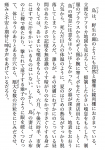Few years ago I discovered my interest in Japanese literature. Until now, I’m ashamed to admit, I only read Haruki Murakami’s works (I’m not through with him, yet) and started some Yukio Mishima’s stories, which I didn’t finish, God knows why. I can’t remember what the titles were, either.
In any case, now, I’m more than prepared to rectify my "past mistakes".
A Personal Matter is my first "encounter" with Kenzaburō Ōe’s works. The story is based on a writer’s personal experience as a father of a brain-damaged child.
Bird, the main character, is a 26th year old, more of a lethargic and messed individual, who lives “split life”. Outside: he’s married (not so happily; his wife is pregnant) and works as a teacher in a school for exam preparation (his father-in-law sets him this job up). Inside: he dreams of traveling to Africa and learns Swahili. Finally, he becomes a father. However, the child is born with a brain hernia. It’s one more problem (though, the hugest one) in Bird’s, already, unsatisfied life. What to do?
There’re two options:
1. To divorce his wife and flee away with his ex-girlfriend Himiko, equally confused character, to Africa
2. To confront his problems (marriage, loss of a job, possibly mentally disabled child)
The theme of this novel is one of my favorite themes: facing a personal dilemma, struggling of a soul. This is maybe the reason I like Dostoevsky’s works so much.
I like the way Ōe concludes the story. Especially the appendix, in which, the writer explains that “real life” is determined with coercions which show you the path of living a proper life.
In any case, now, I’m more than prepared to rectify my "past mistakes".
A Personal Matter is my first "encounter" with Kenzaburō Ōe’s works. The story is based on a writer’s personal experience as a father of a brain-damaged child.
Bird, the main character, is a 26th year old, more of a lethargic and messed individual, who lives “split life”. Outside: he’s married (not so happily; his wife is pregnant) and works as a teacher in a school for exam preparation (his father-in-law sets him this job up). Inside: he dreams of traveling to Africa and learns Swahili. Finally, he becomes a father. However, the child is born with a brain hernia. It’s one more problem (though, the hugest one) in Bird’s, already, unsatisfied life. What to do?
There’re two options:
1. To divorce his wife and flee away with his ex-girlfriend Himiko, equally confused character, to Africa
2. To confront his problems (marriage, loss of a job, possibly mentally disabled child)
The theme of this novel is one of my favorite themes: facing a personal dilemma, struggling of a soul. This is maybe the reason I like Dostoevsky’s works so much.
I like the way Ōe concludes the story. Especially the appendix, in which, the writer explains that “real life” is determined with coercions which show you the path of living a proper life.
Last edited:

